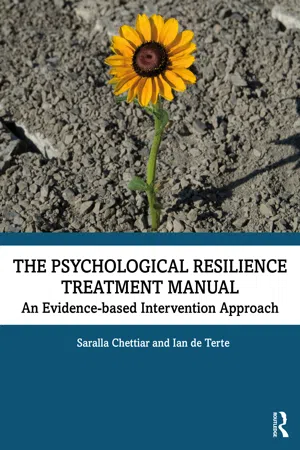
The Psychological Resilience Treatment Manual
An Evidence-based Intervention Approach
- 134 pages
- English
- ePUB (mobile friendly)
- Available on iOS & Android
The Psychological Resilience Treatment Manual
An Evidence-based Intervention Approach
About this book
The Psychological Resilience Treatment Manual (PRTM) provides mental health professionals with an evidence-based guide to psychological resilience treatment designed to equip clients with a toolbox of adaptive coping strategies.
This intervention treatment manual is for practitioners working with clients to develop resilience and the skills they need to cope with daily challenges, reduce stress levels, and increase general well-being without necessarily diagnosing a specific disorder, such as anxiety or depression. The manual is structured around four guided intervention modules: Passive Coping, Self-Care Behaviour, Social Support, and Active Coping. Each module encompasses four one-hour sessions and includes a contents framework, overview, and target objectives for each session. The manual includes 16 client worksheets that correspond to each session, and relapse prevention therapy is incorporated at the end of each module. Flexible in nature, the manual can be used by practitioners in its entirety or modules can be selected as appropriate, depending on a client's needs.
The Psychological Resilience Treatment Manual is an essential resource for qualified and registered psychologists, qualified cognitive behavioural therapy (CBT) practitioners, psychiatrists, and postgraduate counselling psychology students.
Frequently asked questions
- Essential is ideal for learners and professionals who enjoy exploring a wide range of subjects. Access the Essential Library with 800,000+ trusted titles and best-sellers across business, personal growth, and the humanities. Includes unlimited reading time and Standard Read Aloud voice.
- Complete: Perfect for advanced learners and researchers needing full, unrestricted access. Unlock 1.4M+ books across hundreds of subjects, including academic and specialized titles. The Complete Plan also includes advanced features like Premium Read Aloud and Research Assistant.
Please note we cannot support devices running on iOS 13 and Android 7 or earlier. Learn more about using the app.
Information
MODULE 1 PASSIVE COPING
Overview
Goals
Materials needed
- Module 1: Passive coping
- Client worksheets: Passive coping
Module overview
Session 1: The psychology of coping and venting
- -Sustaining and strengthening therapeutic relationship with client
- -Fundamentals of coping
- Modified operational model of stress and coping
- -Passive coping—exploring venting behaviour
- Role-play technique
Session 2: Reviewing behaviour disengagement and self-distraction activities
- -Passive coping—discussing behaviour disengagement and self-distraction as coping strategies
Session 3: Addressing self-blame and denial tendencies
- -Passive coping—self-blame and denial tendencies
- Role-play technique
Session 4: Metacognition and relapse prevention exercises
- Inquiring how they have been using coping strategies in past weeks
- Metacognitive activities
Appendix A
Session 1: Introduction
Therapist to client:
- Welcomes and thanks client for attending the session
- Reassures client that their issues matter
- Reassures and normalise that emotional distress is not a sign of weakness
- It is unique to everyone
- T:In this module, ways of how one can cope best with daily challenges and during ...
Table of contents
- Cover
- Half Title
- Title
- Copyright
- Dedication
- Contents
- List of figures
- List of tables
- Acknowledgements
- INTRODUCTION
- MODULE 1 Passive coping
- MODULE 2 Self-care behaviours
- MODULE 3 Social support
- MODULE 4 Active coping
- Index